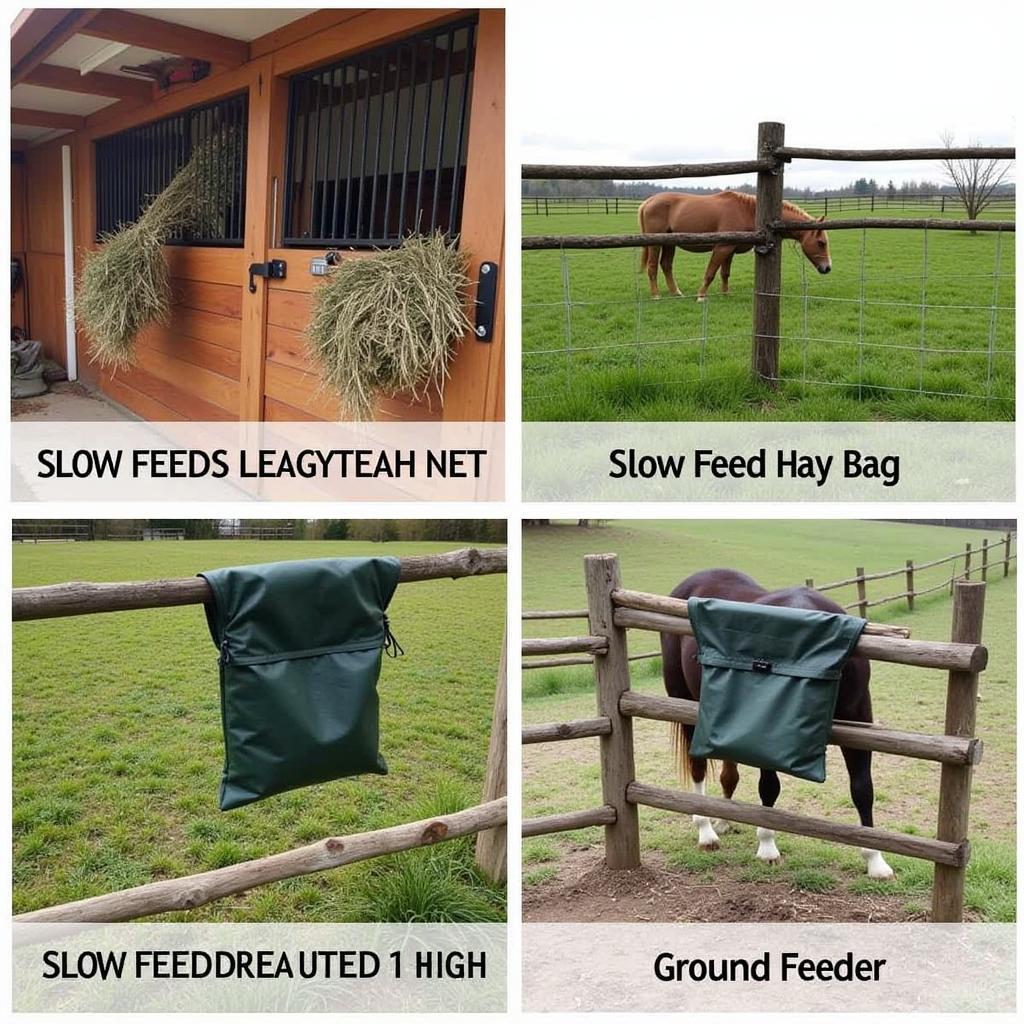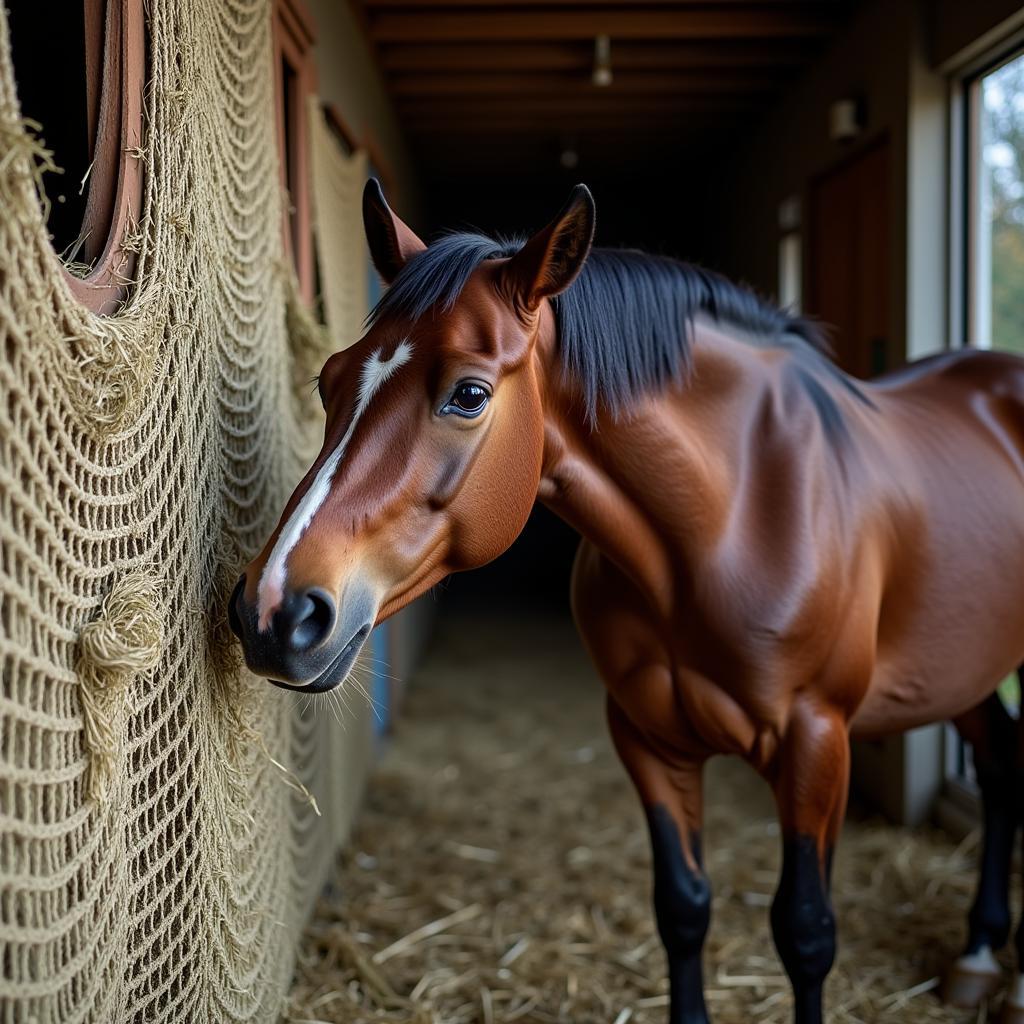Slow feeders are essential for maintaining your horse’s digestive health and preventing overeating. Choosing the Best Slow Feeders For Horses can significantly impact their well-being, reducing the risk of colic and other digestive issues.
Why Use Slow Feeders for Horses?
Horses are designed to graze almost constantly. In their natural environment, they spend the majority of their day nibbling on forage. Domesticated horses, however, often have limited access to pasture and are fed larger meals less frequently. This can lead to a number of health problems, including gastric ulcers, colic, and obesity. Slow feeders mimic natural grazing patterns by restricting the rate at which horses can consume their feed. This helps maintain a healthier digestive system and prevent behavioral issues associated with boredom and hunger. hay slow feeders for horses
 Horse happily using a slow feeder
Horse happily using a slow feeder
Different Types of Slow Feeders
There are a variety of slow feeders available, each designed to suit different needs and environments. Some of the most popular options include hay nets, slow feed hay bags, and ground feeders. Choosing the right type depends on your horse’s individual needs, management style, and the type of forage you’re feeding. Hay nets are a cost-effective option and can be easily hung in stalls or pastures. However, they can sometimes be difficult to fill and may not be suitable for all horses. Slow feed hay bags are another convenient option and offer a higher level of feed restriction. Ground feeders are a good choice for horses who prefer to eat from the ground and can help reduce hay waste. best horse feeders
Choosing the Best Slow Feeder for Your Horse
Selecting the best slow feeders for horses involves considering several factors. First, think about your horse’s individual needs. Does your horse have a history of colic or other digestive issues? Is he or she prone to overeating? Second, consider your management style. Do you have ample space for a ground feeder? Or would a hay net be more practical? Finally, think about the type of forage you’re feeding. Some slow feeders are better suited for hay, while others are designed for pellets or grain.
 Various slow feeder types for horses
Various slow feeder types for horses
What are the benefits of using best slow feeders for horses?
Using the best slow feeders provides several benefits: improved digestion, reduced risk of colic and ulcers, weight management, and reduced boredom.
Dr. Emily Carter, Equine Nutritionist, notes, “Slow feeders are a crucial tool for promoting equine digestive health. They mimic natural grazing behavior, which helps prevent many common digestive problems.”
Tips for Using Slow Feeders Effectively
Once you’ve chosen the best slow feeders for horses for your needs, it’s important to use them effectively. Introduce the slow feeder gradually to allow your horse to adjust. Monitor your horse’s intake to ensure they are receiving adequate nutrition. And regularly clean and maintain your slow feeders to prevent the growth of mold and bacteria. corner horse stall feeders
 Horse eating from a hay net
Horse eating from a hay net
How do I introduce a slow feeder to my horse?
Introduce a slow feeder gradually. Start by offering a small amount of feed in the slow feeder alongside their regular feeding method. Gradually increase the amount in the slow feeder as they become accustomed to it.
Professor John Miller, Equine Behaviorist, adds, “Introducing a slow feeder slowly can help minimize stress and ensure a smooth transition for your horse.”
Conclusion
Investing in the best slow feeders for horses is an investment in their health and well-being. By mimicking natural grazing patterns, slow feeders can significantly improve your horse’s digestive health, reduce the risk of colic and other problems, and contribute to their overall happiness. Choosing the right type of slow feeder and using it correctly can make a world of difference in your horse’s life. Remember to consider your horse’s individual needs and your management style when making your decision.
FAQ
-
How long does it take a horse to adjust to a slow feeder? This varies, but most horses adapt within a few days to a week.
-
Can I use a slow feeder for all types of feed? Yes, but some slow feeders are better suited for certain types of feed.
-
How often should I clean my slow feeder? Clean your slow feeder regularly, at least once a week, to prevent mold and bacteria.
-
Are slow feeders suitable for all horses? Yes, slow feeders are beneficial for most horses, but consult your veterinarian if you have any concerns.
-
How do I choose the right size slow feeder? Choose a size appropriate for the amount of forage your horse consumes and the size of your horse.
-
What are the signs my horse isn’t getting enough to eat with a slow feeder? Weight loss, excessive chewing on objects, and increased aggression are potential signs.
-
Can slow feeders be used for horses on pasture? Yes, slow feeders can supplement grazing, especially in areas with limited forage. hay ring for horses
Common Scenarios
- Scenario 1: Your horse bolts its food and suffers from colic. A slow feeder can help regulate intake and reduce the risk of colic.
- Scenario 2: Your horse is overweight. A slow feeder can help manage weight by extending feeding time and reducing overall intake.
- Scenario 3: Your horse gets bored and develops stable vices. A slow feeder can provide mental stimulation and reduce boredom. grazing bits for horses
Further Reading
For more information on horse feeders, check out our articles on best horse feeders and corner horse stall feeders.
For assistance, please contact us at Phone Number: 0772127271, Email: [email protected] or visit us at QGM2+WX2, Vị Trung, Vị Thuỷ, Hậu Giang, Việt Nam. We have a 24/7 customer support team.